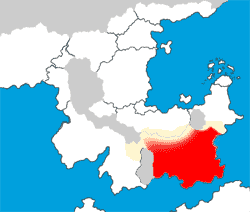Country Info: Marakhin
 |
| Terminology: | Marakh (MARR-ahk) people, one Marakh, many Marakhs |
| Monarch: | numerous emirs |
Marakhin (MARR-ah-keen) is not one country, but a region of numerous "emirates," ruled by "emirs" (eh-MEERS). At any one time there are 15-25 emirs in Marakhin. Therefore, an emir in Marakhin is roughly equal to an earl in northern Hesket, except with absolute local control.
Those to the north send caravans and raiders across the desert to the northern lands; those to the south do the same by ship. Thus, any number of the highly visible Marakhs may be found in Iñarra and Chardreau, much to the discomfort of both kingdoms.
Far from mahiri forests or dwarven mountains, Marakhin has no friendly non-humans. As a result, the Marakhs tend to be wary of all non-humans, including the mahiri, dwarves, and other civilized creatures.
The often fatalistic outlook of the Marakhs has spawned several enthusiastic sects of Balthazar ("Balhazra" as she is called in Marakhin). The hot sun fuels worship of Brinnig, and many turn to Ubrialla for sustenance from the arid land (though Ubrialla is much less a "forest" goddess in their image, understandably). Prayers for Zotra to send welcome rains also ring out in Marakh temples.
Marakhin is largely plateau scrub land, with occasional highly fertile rivers and surrounding lands. The bronze-skinned Marakhs dress in loose-fitting clothes to better cope with the arid climate of their land. Marakhin is a land legendary for its wealth of gold and for the ferocity of its inhabitants; perhaps both are exaggerated.
History
Marakhin was once part of the heart of the Sturian Empire. After the Empire's fall, the Marakhs, a desert nomadic people, filled the void, moving out of the deserts and into the lands beyond. Where the tribes in Hesket's north assimilated into Sturian culture, the Marakhs often supplanted it with their own.
Unaccustomed to a central religious authority, the Marakhs did not recognize the authority of the Collegium (a Sturian institution) after completing their conquest. Today, Marakh worship has no central authority. While many doctrines are shared, authority rests in the hands of local religious leaders, varying from locale to locale.
Nobles
Ruled by a number of Emirs (princes or dukes, roughly), under whom are Sheiks (barons).
Major Cities
Numerous.
